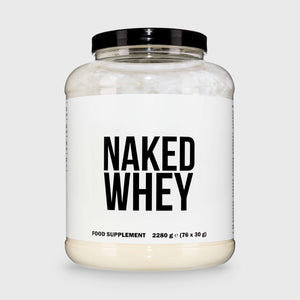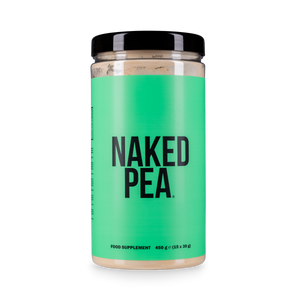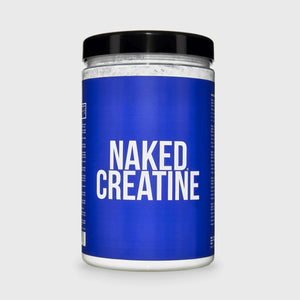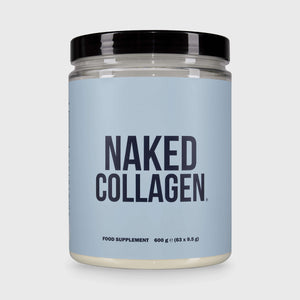Managing acne is no walk in the park. While many of us grow out of this during our awkward teen years, some things can cause acne flare-ups later in life, including certain performance-enhancing supplements, but is creatine one of them?
So the big question is: does creatine cause acne? This article will explore the correlations between creatine supplementation and acne development as well as some tips on how to prevent breakouts when taking creatine.
Does Creatine Cause Acne?

Creatine is one of the most popular supplements particularly among fitness enthusiasts.
If you are considering taking creatine but are afraid of potential acne breakouts, don't worry. Current evidence does not show any relationship between acne and creatine supplementation.
The misconception that creatine supplementation causes acne may come from its use as a supplement for muscle growth.
When people think of taking supplements to increase their muscle size, they often think of anabolic steroids which commonly cause acne as a side effect.
Creatine is a naturally-occurring amino acid in muscle cells while anabolic steroids are man-made compounds that mimic the male sex hormone, testosterone, to help boost muscle mass [].
Additionally, some argue that creatine supplements increase testosterone production which can lead to acne however, this has not been proven.
How Does Creatine Impact Skin Health?

Creatine is an important naturally occurring substance that our body produces on its own; however, we can also obtain it from eating protein foods such as meat, fish, poultry, eggs, and dairy products.
Some individuals may experience changes in their skin health, including additional acne breakouts while taking creatine due to changes in their exercise routine that result in a higher frequency of sweating.
Creatine is a supplement that can help improve exercise performance and increase muscle mass. Those who are working out harder for longer may notice more sweat which can clog pores and result in acne breakouts [].
There has not been any research that confirms any negative implications of taking your creatine supplement and skin health however, there are some positive correlations.
In fact, some studies have found that topical creatine may help reduce visible signs of aging by reducing fine lines and improving skin elasticity and hydration [, ].
Causes of Acne While Using Creatine

It's very unlikely that your acne breakouts are a result of your creatine supplement, but rather it's more likely that there are other lifestyle factors that play a role in making your acne worse. While some anecdotal reports suggest that creatine intake may cause acne, the evidence to support this correlation is weak.
There is likely no link between acne breakouts and creatine supplementation. It is important to consider various factors that may lead to acne such as diet, hormonal imbalances, skincare routine, and even alternative supplements that you may be taking.
Change in Exercise Intensity
The most likely contributor to new breakouts while taking creatine supplements is the change in exercise intensity, leading to sweatier workouts and a higher chance of developing clogged pores.
People who have particularly acne prone skin may need to take extra precautions when working out to keep their skin clean.
Change in Diet

Diet can also affect acne outbreaks. Consuming high glycemic index foods can contribute to acne formation.
Plus, inadequate hydration, protein, and an overall lack of a balanced diet can contribute to acne concerns.
Hormonal acne
For those who struggle with hormone driven acne, it's important to find a good skincare routine that works with you and potentially seek more individualized recommendations for a personalized skincare routine.
While there is no strong scientific evidence to support that creatine causes to hormonal fluctuations, some sources suggest that creatine supplements may impact hormonal acne by altering DHT levels, a hormone that's often associated with acne.
When DHT levels are elevated, sebum production is increased which can contribute to acne. A combination of excess sebum production, bacteria, and inflammation can all contribute to acne.
How to Prevent Acne When Taking Creatine

If you are struggling with new acne breakouts while starting your creatine supplement regimen, there are a few things you can do to help. Maintaining overall skin health is multifaceted as it requires good hygiene, good nutrition, and even managing stress levels.
Ensure clean skin and clothes
First, it's important to completely remove any makeup before a workout. While it may make some feel more confident, sweating with a face full of makeup can lead to clogged pores and ultimately acne development.
This is also true for sunscreen on a hot day. If you workout outside, consider an oil-free sunscreen, or one that states “non-comedogenic” on the label.
Next, be sure to wear clean workout clothes. This is especially helpful if you are someone who struggles with body acne as bacteria can thrive on sweaty clothing and contribute to breakouts.
Maintain good nutrition
When it comes to nutrition for healthier skin, it's important to maintain a balanced diet, ensure adequate protein intake, and keep the skin hydrated by consuming plenty of hydrating foods and beverages.
Ensuring plenty of fruits and vegetables that are rich in antioxidants can also play a role in reducing inflammation which in turn can support healthy, clear skin.
Manage stress levels

Managing stress levels is an important pillar to overall health – skin health included. High stress levels can increase inflammation throughout the body, making the skin more prone to breakouts. Plus, stress can impact how we are eating and sleeping, which can also play a role in acne development.
Practice stress management techniques such as meditation, journaling, and deep breathing to support better skin health.
Reduce exposure to acne-causing bacteria
While working out, always wipe down shared equipment before using it, and try to get in a shower immediately post-workout if you can. This can help with managing acne and can remove acne-causing bacteria and reduce the chances of a breakout [2].
Are There Other Potential Side Effects of Supplementing With Creatine?

Creatine is one of the most extensively studied performance supplements on the market and it is considered safe for most healthy adults when taken as directed and may even provide additional benefits outside of performance.
However, like any supplement, it comes with some potential side effects.
The most common side effects of creatine supplementation are bloating and an upset stomach. This commonly occurs in those taking a loading phase of creatine which involves taking larger doses for a short period to increase your muscle saturation of creatine.
Some people are concerned about weight gain when starting creatine, but it's important to remember that weight gain from creatine is often temporary and a result of fluid shifts rather than fat gain.
These side effects typically go away following the loading phase or can be skipped altogether by sticking with a maintenance dose [, ].
Some researchers have raised concerns over creatine supplementation and potential kidney damage. While short-term research has not found any correlation, there is a need for longer-term studies on this [].
What are the Benefits of Using Creatine?
Creatine has many benefits for fitness enthusiasts as it can not only boost overall health, but it can help with building muscle mass.
Creatine helps your muscles form adenosine-triphosphate (ATP), which is our body's form of energy. This increase in energy allows for improved exercise performance, specifically during high-intensity and intense workouts and resistance training [, ].
Enhancing athletic performance means increased muscle mass. Creatine supplementation is also associated with helping to boost muscle growth [].
Creatine use is well-known for its role in improving athletic performance and boosting muscle growth. There is also some scientific evidence to support creatine's benefits for helping to treat various neurological diseases such as Parkinson's disease, Huntington's disease, and more [11, ].
How to Decide if Creatine is Right for Me?

If you want to enhance athletic performance and boost muscle growth, creatine may be a helpful addition to your routine. However, creatine works best when combined with regular training. Having creatine alone or with inconsistent exercise will not provide the same results.
Additionally, creatine will not likely provide benefits to those who already have naturally high levels of creatine in their muscle tissue. While it won't hurt to take and their may be potential benefits, there is a chance that it may not provide as much of a benefit.
Consider your exercise goals and current routine to help you decide if creatine supplementation may be a good fit for you.
Creatine supplements are considered safe for most healthy adults however, if you are considering starting creatine supplements, be sure to speak with your doctor or healthcare provider before starting for more personalized advice.
Creatine Monohydrate vs HCL: Which is Best?
Both creatine monohydrate and HCL are considered equally effective forms of creatine; however, it's important to note that most scientific evidence supports the use of creatine monohydrate. This is why creatine monohydrate is the gold standard for creatine as it is a more trusted form.
Creatine HCL is a newer form of creatine that is significantly more soluble than creatine monohydrate which means you can take less and avoid bloating with the same results. While this is an added benefit, creatine HCL is still lacking the research that creatine monohydrate has [].
Regardless of which form of creatine you decide is right for you, it's important to keep good skin hygiene especially when working out to reduce the likelihood of acne development.
In the end, the form of creatine that works best depends on what you are looking for in your supplement.
Key Takeaways: Does creatine cause acne?
Creatine is one of the most popular supplements. Creatine is a naturally occurring compound found in muscles, but is also valuable when taken in supplement form. It can increase muscle gains and improve athletic performance, particularly when combined with high intensity workouts or other forms of intense physical activity.
Some people are concerned that creatine supplementation can negatively impact overall their skin and contribute to acne. However, these claims are not supported by scientific evidence.
To maintain healthy skin, there are various lifestyle factors that are important to consider. Maintaining a healthy diet and good skin hygiene are two of the most important things you can do for your skin health.





